|
|
|
Sort Order |
|
|
|
Items / Page
|
|
|
|
|
|
|
| Srl | Item |
| 1 |
ID:
159465
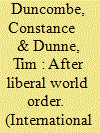

|
|
|
|
|
| Summary/Abstract |
In recent years claims about the end times of the liberal world order have gathered force, with the talk of order giving way to disruption. While there are different accounts of these disruptive dynamics and their causes, it is nevertheless a rare moment in International Relations when all mainstream theories concur that the hegemony of the liberal world order is over and that there is considerable uncertainty about the global architecture that will take its place. Yet claiming that the liberal world order is in trouble is just a starting-point—a deeper account is needed to show how each interrelated element ‘hangs together’. We examine two interrelated patterns to liberal world ordering—internationalism and imperialism. After unpacking each of these interrelated ideas which constitute liberal world order, the narrative will focus on the politics and practice of humanitarianism. Humanitarianism is, of course, deeply intertwined with liberal assumptions about an ethic of care for peoples who are either at risk of, or worse still suffering from, large-scale natural disasters and politically-induced atrocities. Our inference is that the condition of humanitarianism provides a good indication of the state of the liberal world order—its limits and possibilities.
|
|
|
|
|
|
|
|
|
|
|
|
|
|
|
|
| 2 |
ID:
157969
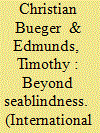

|
|
|
|
|
| Summary/Abstract |
This article examines the rise of maritime security in concept and practice. We argue that developments in the maritime arena have flown beneath the radar of much mainstream international relations and security studies scholarship, and that a new agenda for maritime security studies is required. In this article we outline the contours of such an agenda, with the intention of providing orientation and direction for future research. Our discussion is structured into three main sections, each of which outlines a core dimension of the maritime security problem space. We begin with a discussion of the issues and themes that comprise the maritime security agenda, including how it has been theorized in security studies to date. Our argument is that the marine environment needs to be understood as part of an interlinked security complex, which also incorporates strong connections between land and sea. Second, we examine the ways in which maritime security actors have responded to these challenges in practice, focusing on issues of maritime domain awareness, coordination of action, and operations in the field. Third, we turn to the mechanisms through which the new maritime security agenda is being disseminated to local actors through a process of devolved security governance. We focus particularly on efforts to distribute knowledge and skills to local actors through capacity building and security sector reform. In the conclusion, we outline the future challenges for maritime security studies that follow from these observations.
|
|
|
|
|
|
|
|
|
|
|
|
|
|
|
|
| 3 |
ID:
167112
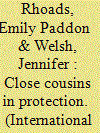

|
|
|
|
|
| Summary/Abstract |
The Protection of Civilians (PoC) in peacekeeping and the Responsibility to Protect (R2P) populations from atrocity crimes are two norms that emerged at the turn of the new millennium with the aim of protecting vulnerable peoples from mass violence and/or systematic and widespread violations of human rights. To date, most scholars have analysed the discourses over the status, strength and robustness of both norms separately. And yet, the distinction between the two has at times been exceptionally fine. In this article, we analyse the constitutive relationship between PoC and R2P, and the impact of discursive and behavioural contestation on their joint evolution within the UN system and state practice over three phases (1999–2005; 2006–10; 2011–18). In so doing, we contribute to the International Relations literature on norms by illuminating ideational interplay in the dynamics of norm evolution and contestation. More specifically, we illustrate how actors may seek to strengthen support for one norm, or dimension of a norm, by contrasting it or linking it with another. Our analysis also reveals that while the two norms of R2P and PoC were initially debated and implemented through different institutional paths and policy frameworks, discursive and behavioural contestation has in more recent years brought them closer together in one important respect. The meaning ascribed to both norms—by representatives of states and institutions such as the United Nations—has become more state-centric, with an emphasis on building and strengthening the capacity of national authorities to protect populations. This meaning contrasts with the more cosmopolitan origins of R2P and PoC, and arguably limits possibilities for the external enforcement of both norms through any form of international authority that stands above or outside sovereign states. This article forms part of the special section of the May 2019 issue of International Affairs on ‘The dynamics of dissent’, guest-edited by Anette Stimmer and Lea Wisken.
|
|
|
|
|
|
|
|
|
|
|
|
|
|
|
|
| 4 |
ID:
158714
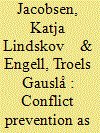

|
|
|
|
|
| Summary/Abstract |
Contemporary conflict prevention depends on information gathering and knowledge production about developments within the borders of a state, whose internal affairs have been deemed precarious by external actors. The international community, especially the United Nations (UN), calls this early warning and early action. However, for governments whose affairs are considered in need of monitoring, preventive endeavours—and the knowledge production they entail—can be seen as ‘early aggression’. In this article, we argue that seeing knowledge production as having power effects reveals contemporary conflict prevention as an interventionary practice. Through an analysis of the international community's preventive diplomacy vis-à-vis Burundi (2015–2016) we highlight three unintended power effects: privileging the UN's knowledge production created resistance to international involvement from the Government of Burundi, it led to a change in patterns of violence and to a backlash against the institutionalization of international monitoring beyond Burundi, and it enabled arguments for further, more forceful, intervention possibilities. This framing enables us to understand the recent return to conflict prevention not as a retreat from liberal interventionism, but as a pragmatic response to its purported crisis. Crucially, although conflict prevention falls short of military intervention, it nonetheless leaves important interventionist footprints.
|
|
|
|
|
|
|
|
|
|
|
|
|
|
|
|
| 5 |
ID:
167109
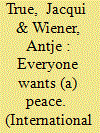

|
|
|
|
|
| Summary/Abstract |
‘Women, Peace and Security’ (WPS) is not just any normative agenda: everyone wants a piece of it. WPS is characterized by unprecedented recognition by states at the United Nations Security Council (UNSC) and the presence of multiple stakeholders, including its own transnational NGO network focused on the first Resolution, 1325. The high degree of participation from civil society in framing the norm from the outset—driving their own access to contestation—makes WPS relatively unique among global normative agendas. It is therefore a good case in which to examine the ‘dynamics of dissent’ and test the effects of discursive and behavioural contestation on normative change. The article seeks to advance the thriving literature on the UN WPS agenda and to further develop the exploratory approach to contestation, which evaluates normative progress based on increased access of all those affected by the norm to practices of norm validation. It maps norm contestation at distinct sites, reflecting a sequence of WPS events referenced at the 2015 UNSC open debate on WPS. It evaluates practices of contestation with regard to affected WPS stakeholders' access to political agency and assesses ‘whose practices’ affect norm change and transformative change in the WPS agenda. The authors conclude that the relative access of the wide range of stakeholders to the different repertoires and constellations of contestation affects the outcomes of WPS. They suggest that scholars should evaluate diverse practices of contestation and identify expanding spaces and choices for a variety of local, national and regional perceptions of gender-equal peace and security. This article forms part of the special section of the May 2019 issue of International Affairs on ‘The dynamics of dissent’, guest-edited by Anette Stimmer and Lea Wisken.
|
|
|
|
|
|
|
|
|
|
|
|
|
|
|
|
| 6 |
ID:
158713
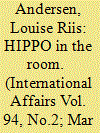

|
|
|
|
|
| Summary/Abstract |
As the global political landscape is in flux, the roles and functions of United Nations (UN) peacekeeping is also shifting. Increasingly, UN peacekeepers are deployed to places where there is no peace to keep. This challenges and undermines existing foundational assumptions of what UN peacekeeping ‘is’. Focusing on the UN peace bureaucracy, this article contributes to the debate on the future of UN peace operations and the pragmatic turn in peacebuilding. It does so by taking a step back to ask not how to make the UN ‘fit for purpose’ but rather for what purpose the international civil servants working for the UN wish the world body to be fit. Zooming in on the review conducted by the High-level Independent Panel on Peace Operations (HIPPO) in 2014–2015, the article interprets the HIPPO as a deliberate push-back against the Security Council's robust turn to stabilization. To counter this militarized form of pragmatism, the HIPPO produced an alternative—more UN-like—yet still pragmatic vision of the future role of UN peace operations in the twenty-first century. The article suggests that while the Zeitgeist is moving from liberal templates towards more pragmatic forms of intervention, the exact role of the UN in this move remains contested—with UN officials actively contributing to the contestations.
|
|
|
|
|
|
|
|
|
|
|
|
|
|
|
|
| 7 |
ID:
158716
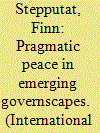

|
|
|
|
|
| Summary/Abstract |
In examining different forms of pragmatic peacebuilding—including the turn to the local, hybrid orders, resilience and non-state actors—this article argues that such approaches bring about analytical and normative challenges that are difficult to deal with within state-centred frameworks. As an alternative, the article develops the notion of ‘governscapes’ as a framing device that can help examine, first, the uneven ways in which the use of force and forms of governance circulate and spread within and beyond state boundaries and, second, how pragmatic peacebuilding approaches play into emerging landscapes of authority and governance. It is argued that pragmatic peacebuilding approaches place too little emphasis on the capacity for using violence that characterizes many of the ‘non-state’ actors that exercise some kind of authority against or alongside state authorities. Finally, the article examines cases in which international actors have engaged non-state actors in order to promote peacebuilding. In one case, from the Democratic Republic of Congo, international actors aimed to build multilevel security arrangements; in other cases that the article mentions, international NGOs and organizations have sought, through partial recognition, to make armed non-state actors more accountable to the populations they control.
|
|
|
|
|
|
|
|
|
|
|
|
|
|
|
|
| 8 |
ID:
165041
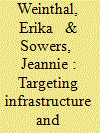

|
|
|
|
|
| Summary/Abstract |
State and non-state actors across many protracted conflicts and prolonged occupations in the Middle East and North Africa have systematically targeted civilian infrastructures. We use the cases of the West Bank and Gaza, characterized by more than five decades of occupation and periods of intermittent violent conflict, to analyse how the targeting of water, energy, and agricultural infrastructures has created humanitarian crises and undermined civilian livelihoods. Our analysis draws upon an original database tracking the targeting of environmental and civilian infrastructures and on interviews with humanitarian organizations, government officials and civil society actors. The analysis shows how the targeting of infrastructure has differed in the West Bank and the Gaza Strip. In the West Bank, damage to essential infrastructure and restrictions on infrastructure development are forms of slow violence that accumulate over time, carried out by both state authorities and settlers. In the Gaza Strip, recurrent violent conflict between Israel and Hamas has produced extensive destruction across all types of infrastructure, while the internationally-sanctioned blockade has hindered effective reconstruction. In both cases agriculture is the most frequently targeted sector, undermining livelihoods and connections to land, while damage to water and energy systems has limited economic activity and rendered civilian life increasingly precarious.
|
|
|
|
|
|
|
|
|
|
|
|
|
|
|
|
| 9 |
ID:
157975
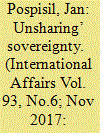

|
|
|
|
|
| Summary/Abstract |
In order to work, international peace- and statebuilding has had to reshape the traditional notion of state sovereignty and legitimize increasingly interventionist endeavours in terms of an attenuated ‘shared’ sovereignty. Over the last decade, however, governments in recipient states have pushed back, demanding a more active role in negotiating with their OECD counterparts. The g7+ group, an international organization of now 20 self-proclaimed fragile states, has evolved as a key actor from the global South dealing with international peace- and statebuilding. The group's approach to multilateral negotiations on development goals, and its creative use of donor concepts and approaches such as resilience, ownerships and measuring development progress, challenge the customary peace- and statebuilding practices. This challenge demonstrates that political elites in fragile states have started to self-confidentially occupy the arenas of statebuilding and development. This article argues that in so-doing the g7+ group establishes a post-liberal sovereignty claim that is based on two pillars: resilient nationhood, and selectivity in the application of global liberal principles. Since it relies on the development policy principle of national ownership, such post-liberal sovereignty is difficult to counter for actors subscribed to liberal norms. Effectively, sovereignty is ‘unshared’ again.
|
|
|
|
|
|
|
|
|
|
|
|
|
|
|
|
| 10 |
ID:
159468
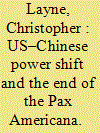

|
|
|
|
|
| Summary/Abstract |
In this article, I show that far from consenting to be bound by institutions and rules of the Pax Americana, China is already working to recast the international order in ways that favour its interests, not those of the United States. The US foreign policy establishment does not grasp this, and, instead, has invested the idea of a ‘rules-based, institutionalized’ international order with a talismanic quality. It claims that rules and institutions are politically neutral, and, ipso facto, beneficial for all. However, in international politics, who rules makes the rules. Rules and institutions reflect the distribution of power in the international system. A power transition is taking place in the early twenty-first century: US power is in relative decline and China is rising quickly. No international order—not even the Pax Americana—lasts forever. The liberal world order cannot survive the erosion of US hegemonic power. It is this structural change, not Donald Trump, that threatens the post-Second Word War international order's survival. It requires a huge leap of faith to believe that a risen China will continue to subordinate itself to the Pax Americana.
|
|
|
|
|
|
|
|
|
|
|
|
|
|
|
|
|
|
|
|
|